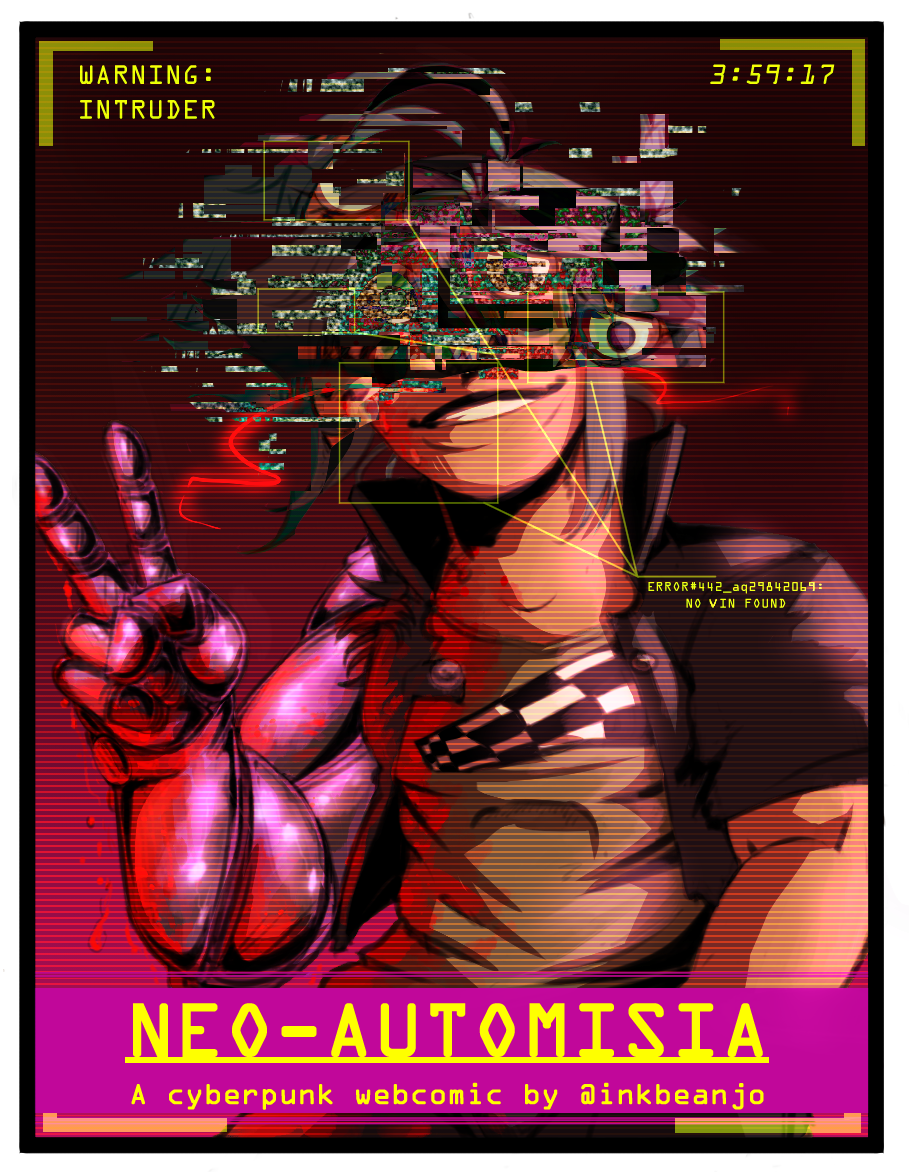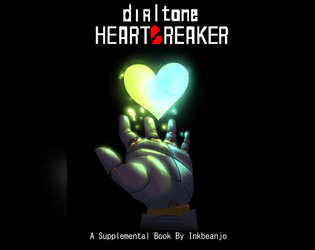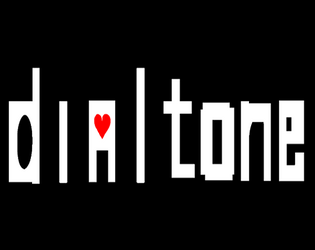In all honesty? 3 is a comfortably workable number of players, but that isn't a hard limit- Feel free to add more!
InkbeanJo
Creator of
Recent community posts
It's all themes at the end of the day! Each hue touches on a particular sort of broad category of persona, or dynamic, which influences their boon/blessing/bane. Beacons being fonts of hope and try-again determination, but ultimately being ESPECIALLY effective only a few times while others try to snuff them- Heartbreaker's taking the first and most direct routes to come to mind, and being very inflexible in diverting from indulging that impulsiveness. Soul-Possessed having access to an almost uncanny perceptiveness and knowledge, but ultimately being forced to live through a very real depersonalization/derealization at the hands of an entity who is ultimately alien to them, etc.
Boons are often a smaller, lesser benefit- whether passive or paid in guts, or single use, that players can draw on freely; blessings are more overt/potent, representing the core of the hue's themes as well as offering considerable influence or power. Banes are, on the other hand, the crux of those same themes- like flipping a tarot card upside down, and mirroring a hue's flaws in distinct clarity.
If you'd like examples from other TTRPGs that influenced this kind of thinking and approach, i highly highly recommend both Changeling: The Lost and it's predecessor Changeling: The Dreaming; both are games about the fae in the modern day, where player archetypes/fae-kith come with their own birthrights and frailties in similar manner to what i've written in Heartbreaker.
It depends on how you mean- my approach to dialtone's soulless was a bit different than UT/the bits of deltarune we've seen up through chapter 2, in that the lack of a soul doesn't deny someone their personhood or MAKE them into an unfeeling monster. The tagline i wanted to highlight most was "Is this how you are? Maybe- but it doesn't mean you have to be. It doesn't mean you can't try."
A lot of the hues-writing was made to pave way for character hooks one could use as a guideline if they didn't have anything else- in the case of the soulless, perhaps making it a long-term goal to regain their soul or question what it means to lack one/still have agency in their lives. That being said, even as the writer/designer for the game, i'm always going to defer to players and encourage them to approach or adjust mechanics as they see fit; if the boon/blessing/bane for the soulless is a lot to handle, you can adjust as you see fit.
If it helps you any, my intent was to kind of emphasize the weight of consequence with them- the boon and blessing are radically potent in combat... but by and large just combat. TTRPGs by and large often aren't just combat, and have a lot of interpersonal relationships or dynamics going on between party members and npcs- thus the bane literally makes it harder to wear your heart on your sleeve, and to be known by others in an emotional capacity.
Nah you don't gotta apologize, I'm not as active on reddit- Thus far this's been where people usually ask game related questions, so I keep a closer eye on it. That and reddit's not really been good for me in the past/it's been impossibly hard to get my art to go anywhere, so I've more or less given up trying xwx;
That's one way to go about it- this isn't to say combat isn't on the table, but more a suggestion that the emphasis be on the nature of conflict rather than the cards drawn/damage done.
A good example I referenced in the pdf is the fan webcomic Paper Trail, by Lynxgriffin; it's a full story focused on the bare fragments of stuff we got during Deltarune's first chapter, and a lot of personal interpretation/expansion from the author- this includes a lot of what amounts to pacifist only encounters that require weird solutions, or otherwise engaging with the denizens and cast of npcs on their level/engaging with the overall drama of things.
At least for me/the ttrpgs I've played over time, I've quickly gotten to really enjoy the underlying tension of plots and conflicts rather than solely getting to roll dice, even as a big fan of fist-to-fist combat. Like... getting into the spirit of the conflict as opposed to only the mechanics, if that makes sense- being thrilled as hell to roleplay out how my cyborg in one game handles a fight against someone who is the absolute antithesis of everything she believes, to the point of seeing blood red and nothing else, or playing up the desperation in another character's futile attempts to even bruise another in what's effectively a very tense """""friendly"""" spar mid road trip. imo there's no such thing as boring if you're willing to get into it or silly with it, especially if the rest of the table is too- i can only say that if you're dead-set on combat, then it may be a good idea to whip up denizen stats on your own to see what works. If something feels too hard for your players, don't be afraid to dial it back mid-game or ease the encounter to your discretion uwub
A lot of work on the system was concept and roleplay first, and strict mechanics second; I'm a big fan of narrative TTRPGs in the vein of World of Darkness or other rules-as-suggestions systems, and i like to make things geared toward telling stories as opposed to mechanically complicated systems.
Playtesting more or less involved keeping a deck of cards with me at my dayjob/during breaks so i could run simple numbers that felt similar(?) to Deltarune's combat- though like Undertale, it and UT kind of disincentivize combat as a direct solution (in the no-mercy route, non-boss combat required for progression is intentionally made to be banal and painfully rote), so i went into this knowing lateral thinking/solutions would be more or less the focus.
The hard part was/is always stat balancing, which I'm never good at and kind of just have to accept that's the case (especially for the example denizens, it varies wildly). Even in home games I err on the side of easier encounters/etc isms for players because I'm interested in seeing stories escalate, or giving players problems that can't be solved directly or simply.
I'm glad to hear you enjoyed it! ;w;bb
Unfortunately when it comes to stats and balancing that's the area I'm weakest in/that gives me THE most stress when it comes to ttrpgs; I'm a storyteller first and foremost in the games I run, and while I've been able to make tweaks to the stat blocks of other games to meet that end (World of Darkness, Shadowrun, etc), I'm full aware that a mistake on my end could turn a trivial encounter into a slog or an unwinnable scenario. Since Deltarune tends to focus on creative solutions as opposed to beatdowns in combat, I thought I could leverage that in my favor.
Combat may be disincentivized, but it's still an option; the way I worked with Dialtone's stats was by and large looking to official enemy stat values like health in Deltarune itself, and work backward. Enemies usually only get one turn while the player side has 2-3+ characters making attacks-in a perfect world depending on player stats and class/abilities you've come up with, a good attack draw from each player puts that at 30-ish damage per turn.
I know that's kinda long winded sorry, but it's the logic I went into stuff with. Dialtone's my first game, and while I've GM'd a lot of ttrpg things over the years stats and the math end thereof aren't my strong suits xwx;
AH- I work on projects like this solo, and the Heartbreaker content is mostly optional for play as opposed to required or necessary. I work a dayjob that eats up a lot of my spare time, and both Heartbreaker and the core Dialtone books took about a year each to fully flesh out, format, and create art for- all atop my other responsibilities such as taking care of friends and my partner, and the webcomic I put the majority of my time into. It's a lot of labor, and at present I don't make very much money for my artwork that'd let me do it full time, even though I'd really like to-charging for the optional content/artwork in Heartbreaker helps me get there a bit! 'w'b
Ah, I apologize- I'd written the game's systems with card-drawing in mind/the fun shenanigans you can get up to with cards like ties (playing war) and having a limited set of cards to draw from as opposed to the anything-goes of dice. To make a dice-friendly version of the system would basically mean doing a full rewrite of the book and trying to math things out again, which'd take another half year for me to do 'cause I'm real slow ;;
That being said, if you're playing online there's a few options at your disposal! There do exist online card-drawing sites that a GM can stream the results of for a given game as players take actions, and apparently a few discord bots specializing in playing cards- though I can't attest to the latter 'cause I haven't used them before/mostly used a different method.
If you're willing, roll20 is free and also has deck card capabilities atop other niceties/dice functions for other games/custom asset import/etc things that're good for a theater of the mind game like dialtone; I've used it to play Shadowrun and a few other ttrpgs in the past, it's very handy in a pinch.
If tables want, they're more than welcome! My intent in including the soul chart was by and large solely for the purposes of levity in character creation, as the soul types are one to one based on the types of quarks in subatomic physics- their use or interpretation will vary from table to table, as I never intended them to give mechanical benefit and hoped players might be able to figure out quirks of their characters with their choice.
I'd also wanted the importance of the souls to be extremely variable atop that, going so far as to imply it through the rulebook art and the party depicted; Caroline is the ACTor of the party and functionally party leader, but her soul is her own. Conversely Monique has a soul more akin to the player characters in Undertale and Deltarune, in that it possesses her, but Moni and the soul itself lack the agency Caroline has. The gist being that I thought it'd be more fun narratively to play with the situation as opposed to a mechanical bonus xwx
Thank you for your feedback though!
Souls and their utility are extremely nebulous within Deltarune's setting, especially with Kris's being a stand-in for the player's agency therein- I wanted to leave that sort of stuff open ended within the ruleset as a toy for gamemasters to play with, or tables to interpret for their own games as opposed to setting down hard rules on what a top or charm soul would provide as a benefit. It speaks more to your personal preferences and tastes/character, you know?
Moreover while they're included in character generation, it's wholly up to the player/gm as to the nature of that soul. For example, the girl Monique in the ruleset's example party would be a FIGHTer class wise, yet is portrayed with what's essentially a weird player soul- Caroline on the other hand has a non-player soul, yet is the ACTor of the party and agreed leader of the bunch. If players/gm's/tables decide they'd like to elaborate on the different flavors of soul and the natures thereof for their games, I'd highly encourage it; Dialtone as a system is purposefully left open ended so that isn't hampered by strict rulesets.

Session compiled- begin playback.
Megacorporate superpowers. A resurgence of Magic. Crime on Demand.
Welcome to a New Kind of Sprawl.
Dystopias never change, bud- they just get a new coat of paint. A gun for hire coming out of a depressive spiral, Monique is a Night Runner- and for all the insane cred crime pays, all she wants is a bit of direction in life.
The first chapter of my cyberpunk webcomic, Neo Automisia, is finally out in PDF format, for those who'd like offline viewing options or just to support the comic itself!




